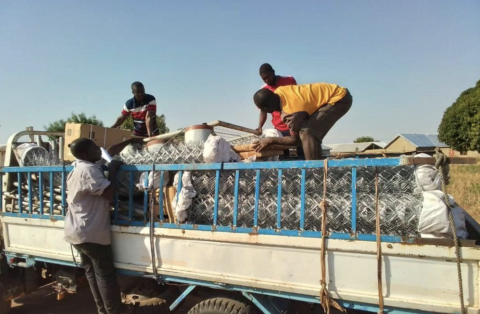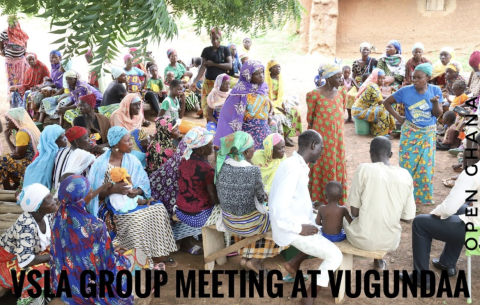New fences, solar water pumps and loan schemes for vulnerable farmers in Ghana
New fences, solar water pumps and loan schemes for vulnerable farmers in Ghana
In Ghana, Assibi Ayambila found support and solace through a dry-season garden initiative by Open Ghana, improving livelihoods and fostering community empowerment and gender inclusivity in rural areas. This story is part of a series celebrating the locally-led solutions supported by the UNDP implemented - Adaptation Fund Climate Innovation Accelerator programme.
Like many other women in the village of Goere, Ghana, Assibi Ayambila says she used to feel trapped in loneliness and isolation.
“Our husbands worked tirelessly as security men, leaving us to manage our households alone. It was a challenging and often lonely experience,” she says.
Thankfully, the pressure on her husband has eased now that she has a sustainable source of food and income: a dry-season garden.
The garden was set up by a climate mitigation organisation known as Open Ghana,
using a grant from the Adaptation Fund and the European Union. The fund supports climate innovation in developing countries through its UNDP-Adaptation Fund Climate Innovation Accelerator (AFCIA) programme.
Ayambila and the rest of the Goere community say they are already reaping the benefits.
“We were able to sell surplus vegetables at the local markets, gaining economic independence and contributing to our household finances. This newfound financial stability has allowed me to invest in my children's education and provide them with better healthcare. I now have hope for a brighter future for my family,” she says according to an Open Ghana report.
The group established similar gardens in several other villages, including Vugundaa and Mettoh Yipaal, all within the northern, north east, upper east and upper west regions of Ghana.
They also built fences, established community savings schemes, and procured solar water pumps for irrigation during the dry-season.

“We have a lot of sunshine in Ghana,” says Isaac Naanpukin Kombat, executive director of Open Ghana. “Instead of using diesel water pumping machines, which will involve the farmers having to buy fuel for the machine, we are using the solar water pumping machine.”
While the gardens will certainly boost food security and nutrition in these areas, Kombat says their focus was really on creating sustainable incomes for the women, youth and people with disabilities who live there.
He says that despite available land, water and ready markets for dry season gardening, these vulnerable groups are unable to raise capital to invest in irrigation equipment.
“With Open Ghana and AFCIA support and guidance, we learned sustainable agricultural practices suitable for our region's climate,” says Ayambila. “They provided us with tools, seeds, and training to cultivate a variety of vegetables and fruits in the dry season. The joy and sense of empowerment I felt when I saw the garden flourishing were indescribable.”
Alidu Seidu, a farmer from Vugundaa in the North of Ghana, agrees. He says where he lives, farmers are now able to intercrop maize and rice, in addition to the vegetables they produce in the dry season, bringing in more money than ever before. “It has been a huge relief to have a farm that is fenced,” he tells the Open Ghana team in his home language.
In Mettoh Yipaal, a new solar water pump and fencing materials complemented the construction of a mud wall, which protects crops from animal invasions during the dry season.
As in many of their intervention areas, Open Ghana also helped establish a Village Savings and Loans Association (VSLA) here. The association meets weekly so that residents can pool savings, while sharing experiences and encouragements to foster social cohesion.

“As the VSLA flourished, so did the sense of empowerment and ownership within the community,” Open Ghana reports.
Kombat says people in Mettoh Yipaal previously had to travel as far as Burkina Faso to purchase vegetables for retail, making it expensive to sell and for consumers to buy locally.
His team reports that the impact of the community growing vegetables in their own garden instead has been remarkable so far.
“Mettoh-Yipaal has now become a vibrant hub of fresh vegetable production. The arid land has been transformed into a productive one. Local vegetable businesses have flourished, fostering entrepreneurship and creating economic opportunities.”
Abass Ubeida, a seller at the local market who buys her vegetables from the garden producers, says life has changed for the better.
“As one of the vegetable market queens … we faced tremendous challenges in providing for our families,” she says. “Travelling long distances to purchase vegetables was not only physically demanding, but financially burdensome and risky as well. This initiative has given us hope, financial independence, and a brighter future for ourselves and our families.”
Kombat says several other communities have expressed interest in setting up their own dry-season gardens. “And so we are on the watch for extra funding to be able to extend this to other communities so that we can make a bigger impact,” he says.
In the meantime, he advises anyone who would want to replicate Open Ghana’s intervention to ensure gender inclusivity in their projects.
He says in this part of the world, people’s traditional and religious beliefs mean that it is common for men and women to work alone rather than together.
“We were able to overcome it by giving them training in gender and social inclusion, and they now see themselves as a mixed group who work together to address the challenges that confront them, and then benefit from group synergy,” he says.
About this article:
This story has been co-created with the support of Open Ghana, UNDP, CDKN, ICCCAD, and GRP, under the framework of the UNDP-managed Adaptation Fund Climate Innovation Accelerator (AFCIA).
The UNDP-AFCIA programme counts on financial contributions from the Adaptation Fund and the European Union and has awarded 44 micro and small grants to locally-led organisations across 33 countries worldwide, accelerating their innovative solutions to build resilience in the most vulnerable communities.
UNDP-AFCIA, is one of the funding windows anchored under the Adaptation Innovation Marketplace (AIM), a multi-stakeholder strategic platform that promotes scaled-up adaptation at the local level, launched by UNDP Administrator Achim Steiner at the Climate Adaptation Summit in January 2021.
